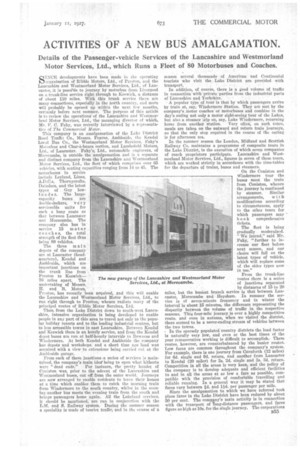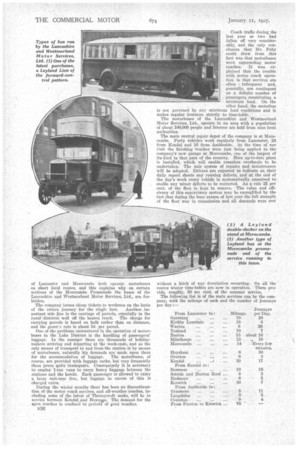ACTIVITIES OF A NEW BUS AMALGAMATION.
Page 55

Page 56

If you've noticed an error in this article please click here to report it so we can fix it.
Details of the Passenger-vehicle Services of the Lancashire and Westmorland Motor Services, Ltd., which Runs a Fleet of 80 Motorbuses and Coaches.
SINCE developments have been made in the operating organization of •Ribble Motors, Ltd., of Preston, and the Lancashire and Westmorland Motor Services, Ltd., of Lancaster, it is possible to journey by motorbus from Liverpool on a trunk-line service right through to Keswick, a distance of about 110 miles. With this trunk service there are many connections, especially., in the north country, and more will probably be opened up within the next few months, certainly before next summer. The purpose of this article is to review the operations of the Lancashire and Westmorland Motor Services, Ltd., the managing director of which„ Mr. F. C. Fahy, was recently interviewed by a representative of The Commercial Motor.
This company is an amalgamation of the Lake District Road Traffi3 Co., Messrs. Foams, Ambleside, the Kendal Local Bus Co., the Westmorland Motor Services, lorthy's Motorbus and Char-it-bancs section, and Lambstield Motors, Ltd., of Lancaster. relay's, Ltd., automobile engineers, of Morecambe, is outside the amalgamation and is a separate and distinct company from the Lancashire and Westmorland Motor Services, Ltd., the fleet of which comprises over 65 vehicles, with seating capacities ranging from 14 to 45. The motorbuses in service include Leyland, Lions, A.D.C.s, Thornycrofts, Daimlers, and the latest types of Guy lowloade C. The largecapacity buses are
inutile-deckers, ve ry serviceable units for such a busy route as that between Lancaster and Morecambe. The company also has in service 15 motor coaches, the total strength of its fleet thus being 80 vehicles.
The three main depots of the company are at Lancaster (headquarters), Kendal and Ambleside, which . are important junctions on the trunk line from Preston to Keswick76 miles apart The undertaking of Messes. U. and B. Motors, Preston, has recently been acquired, and this will enable the Lancashire and Westmorland Motor Services, Ltd., to run right through to Preston, whence radiate many of the principal routes of Ribble Motor Services, Ltd.
Thus, from the Lake District down to south-west Lancashire, intensive organization is being developed to enable people in any part of this area to travel not only to the popular holiday resorts and to the leading industrial centres, but to less accessible towns in east Lancashire. Between Kendal and 'Keswick there is an hourly service, and from the Kendal depot buses are run at half-hourly intervals to lowness and Windermere. At both Kendal and Ambleside the company has depots and workshops; and a short time ago laud was acquired with a view to extensions being carried out at the Ambleside garage.
From each of these junctions .a series of services is maintained, the company's main iderebeing to open what hitherto were "dead ends." For instance, the pretty hamlet of Couiston was, prior to the advent of the Lancashire and Westmorland buses, cut off from the outer world. Journeys are now arranged to enable residents to leave their homes at a time which enables them to catch the morning train from Windermere to the south country, whilst in the evening another bits meets the evening train from the south and brings passengers home again. All the Lakeland services, It should be mentioned, are run in conjunction with the L.M. and S. Railway system. During the summer season a speciality is made of tourist traffic, and in the course of a
season several thousands of American and Continental tourists who visit the Lake District are provided with transport.
In addition, of course, there is a good volume of traffic in connection with private parties from the industrial parts of Lancashire and Yorkshire.
A popular type of tour is that by which passengers arrive by train at, say, Windermere Station. They are met by the company's Motor coaches or motorbuses and combine in the day's outing not only a motor sight-seeing tour of the Lakes, but also a steamer trip on, say, Lake Windermere, returning home from another station. Very often, on such tohrs, meals are taken on the outward and return train journeys, so that the only stop required in the course of the outing is for afternoon tea.
In the summer season the London, Midland and Scottish Railway Co. maintains a programme of composite tours in the Lake District, in the execution of which seven companies of coach proprietors participate. Lancashire and Westmorland Motor Services, Ltd., figures in seven of these tours, which are worked strictly in accordance with the time-tables for the departure of trains, buses and steamers.
On the Coniston and Windermere tour the buses meet the train from Coniston, whence the journey is continued by steamer. Similar
arrangements, w i t Is modifications according to circumstances, apply to the other tours for which passengers may book comprehensive tickets.
The fleet is being gradually modernized. "We intend," said Mr. "further to increase our fleet before next season, and our choice will fall on the latest types of vehicle, which will replace some of the older types now in use."
From the trunk-line routes there is a series of junctions separated by distances of 15 to 20 miles, but the busiest branch service is that between Lancaster, Morecambe and Heysham. In summer the service is of seven-minute frequency and in winter the interval is about 15 minutes, the difference representing the disparity between the volume of traffic in the respective seasons. This four-mile journey is over a highly competitive route. and even in autumn when we visited the district, there seemed to be a never-ending stream of vehicles between the two towns.
In the sparsely populated country districts the load factor is naturally very low, and even at the best times of the year remunerative working is difficult to accomplish. These routes, however, are counterbalanced by the busier routes. Low fares are common throughout the company's system. For example, there is one journey from Carnforth (12 miles) for 6d. single and 9d. return, and another from Lancaster to Kendal (20 miles) for 2s. 2d single and 3s. 3d. return. Competitionin all the areas is very keen, and the policy of the company is to develop adequate and efficient facilities to and in all the areas at as low a fare as possible, compatible with the provision of comfortable travelling and reliable running. In a general way it may be stated that fares vary between id. and 1id. per passenger per mile.
Since the amalgamation to which we have referred took place fares in the Lake District have been reduced by about 50 per cent. The company's main activity is in connection with the transport of Tong-distance passengers, and fares figure as high as 10s. for the single journey. The corporations of Lancaster rtnd Morecambe both operate motorbuses on short local routes, and this explains why on certain sections of the Morecambe Promenade the buses of the Lancashire and Westmorland Motor Services, Ltd., are forbidden.
The company issues cheap tickets to workmen on the basis
of the return journey for the single fare. Another. important side line is the carriage of parcels, especially in the rural' districts' well off the beaten track. The charge for carrying parcels is based on bulk rather than on distance, and the eener:, rate is about 3d. per parcel.
One of the problems encountered in the operation of motorbuses in the Lake District -is the handling of passengers' luggage. In the summer there are thousands of holidaymakers arriving and departing at the week-ends, and as the only means of transport to and from-the station is by means of motorbuses, naturally big demands are made upon them for the accommodation of luggage. The motorbuses, of course, are provided with luggage racks, but very frequently these prove quite inadequate. Consequently it is necessary to employ 1-ton vans to carry heavy baggage between the stations and the hotels. Each passenger is allowed to carry a largo suit-case free, but luggage in excess of this is charged extra.
During the winter months there has been no discontinuation of the motor coach services, and all-weather coaches, including some of the latest of Thornyeroft make, will be in service between Kendal and Bownws. The demand for the open coaches is confined to period/ of good weather. Coach traffic during the last year or two had fallen off very considerably, and the only conclusion that Mr. Fahy could draw from this fact was that motorbuses were superseding motor coaches. It was explained that the trouble with motor coach operation is that services are often infrequent and, generally, are contingent on a definite number of passengers constituting a minimum load. On the other hand, the motorbus is not governed by any minimum load conditions and it makes regular journeys strictly to time-table.
The motorbuses of the Lancashire and Westmorland Motor Services, Ltd., operate in an area with a population of about 100,000 people and licences are held from nine local authorities.
The main central repair depot of the company is at Morecambe. Forty vehicles work regularly from Lancaster, 24 from Kendal and 16 from Ambleside. At the time of our visit the finishing touches were just being applied to tho company's new garage at Morecambe, one of the largest of its. kind in that part of the country. Here up-to-date plant is installed, which will enable complete overhauls to be undertaken. The unit system of repairs and maintenance will be adopted. Drivers are expected to indicate on their daily report sheets any running defects, and at the end of the day's work every vehicle is systematically examined to enable any minor defects to be corrected. As a rule 25 per cent, of the fleet is kept in reserve. The value and efficiency of this supervisory system may be exemplified by the fact that during the busy season of last year the full strength of the fleet was in commission and all demands were met without a hitch of any description occurring. On all the routes winter time-tables are now in operation. These provide, roughly, 50 pet cent, of the summer service.
The followmg list is of the main services run by the company, with the mileage of each and the number of 5ourne3rs per day:—




































































































